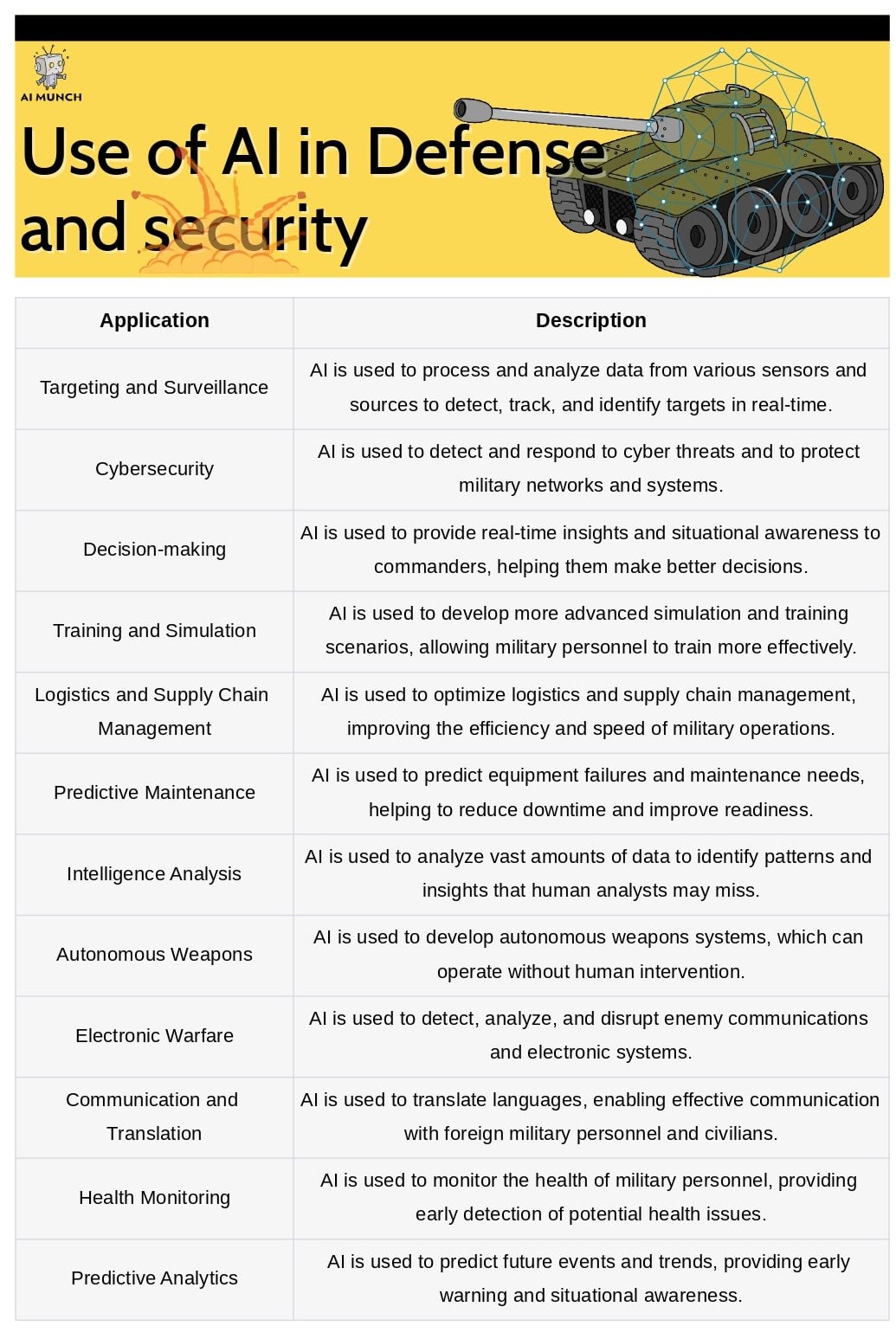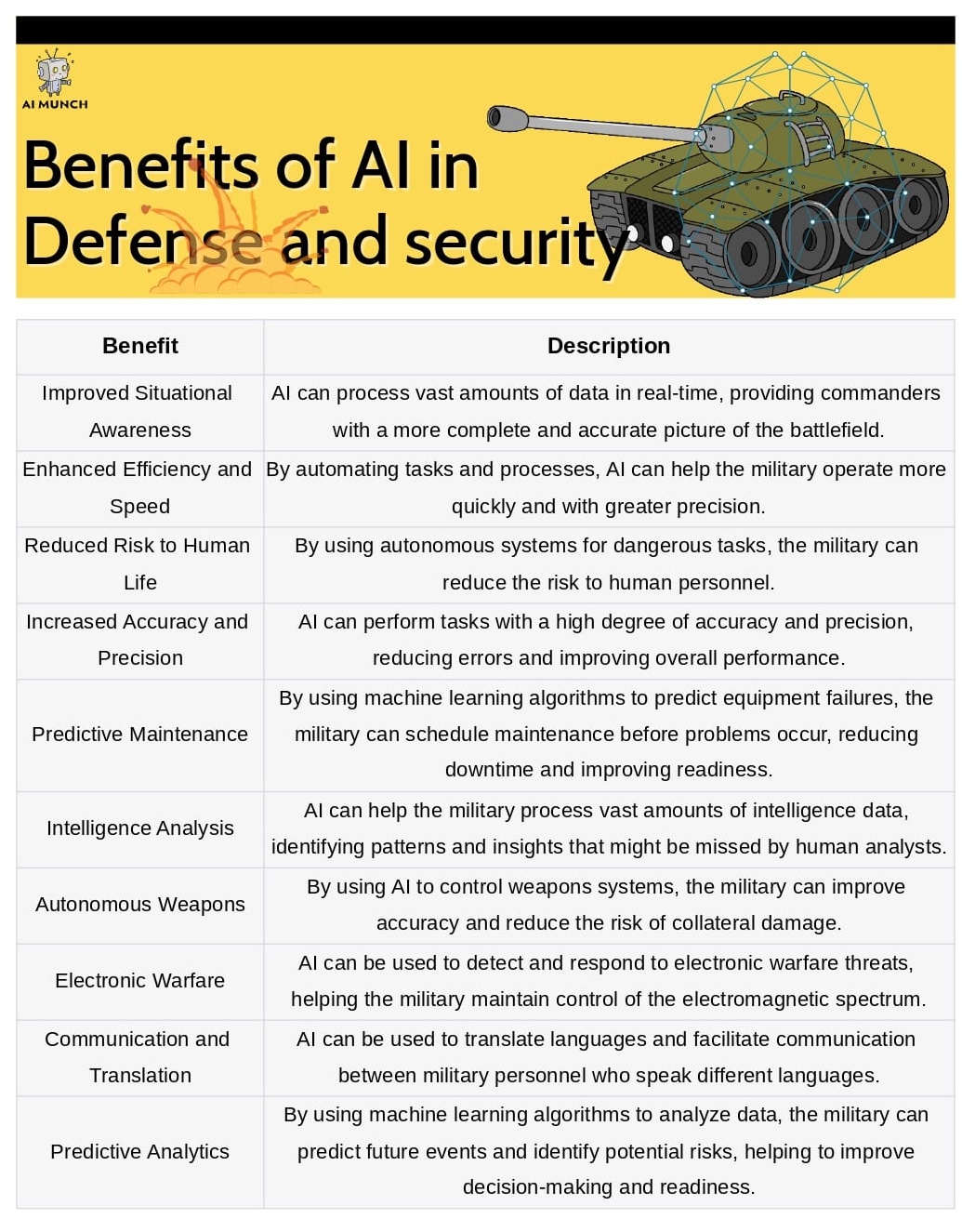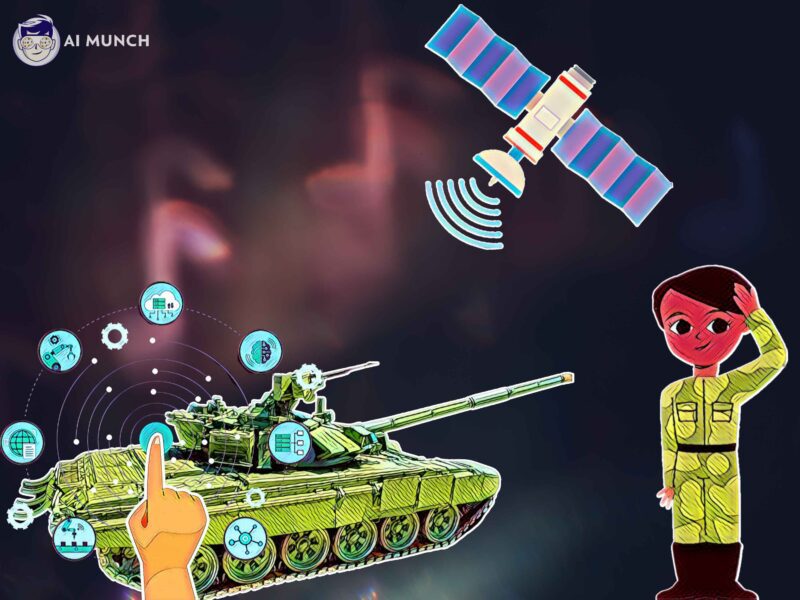I. Introduction
Since everyone wants security in their lives, the use of AI in aerospace and defense is multiplying. Of course, in this chaotic world, AI in defense industry is necessary. The term “artificial intelligence” (AI) describes machines’ capacity to learn, solve problems, make decisions, and spot patterns, all of which are typically reserved for human beings. “AI in defense” refers to using AI-based tools in every part of the military, from weapons systems and intelligence gathering to managing supply chains and cyber defense.
Artificial intelligence affects us in many ways, and its use in defense is one of them. The application of AI to military defense has the potential to increase precision, velocity, and efficiency while decreasing casualties and expenses. However, there are also risks and ethical considerations associated with using AI in defense. For example, autonomous weapons could accidentally go off or be used maliciously.
A.Brief history of AI in Defense
Since at least the 1950s, when the US Air Force began using computers to simulate complex military scenarios, AI has been used in the defense industry. Since then, many defense applications have used AI, including NLP, autonomous systems, and image recognition. There is so much research going into the use of AI in defense industry. Therefore, AI in defense systems is something we cannot ignore.
Recently, militaries worldwide have shown a growing interest in and investment in artificial intelligence (AI), thanks to developments in technologies like deep learning, machine learning, and natural language processing. Predictive maintenance, intelligence analysis, and autonomous weapons are just some ways AI is currently used in the defense industry.
B. Importance of AI in Defense
We have discussed AI in security; we talked briefly about AI in defense systems. Artificial Intelligence has the potential to make military operations more effective and efficient, which is why it is so important to the defense industry. AI technology can sort through vast amounts of data to find meaningful patterns and insights that can help the military make strategic decisions. Logistics and supply chain management are two examples of tedious tasks that AI can do for us so that we can focus on more complicated tasks.
AI in aerospace and defense is growing day by day. With the help of AI, targeting and surveillance can be made more accurate and precise, which means that there will be fewer “collateral deaths.” In addition, using autonomous systems can make it safer for human soldiers to be in high-risk or dangerous situations.
However, ethical concerns arise from employing AI in defence, such as the possibility of AI being used for malicious purposes and the need to guarantee that AI systems are open, accountable, and impartial. Therefore, militaries need to weigh the pros and cons of using AI for defence and craft policies and regulations to ensure that AI is used responsibly and ethically.
II. Uses of AI in Defense
A. Targeting and Surveillance
Intelligence gathered from satellites, drones, and other sensors is analyzed by AI to help with targeting and surveillance. Artificial intelligence systems can sift through mountains of data, picking out patterns and outliers humans might miss. The United States military uses artificial intelligence to analyze drone footage to better target their attacks.
B. Cybersecurity
Artificial intelligence (AI) is used in the cybersecurity industry to help detect and respond to cyber threats in real-time. Analyzing network traffic, AI systems can spot unauthorized access and other forms of suspicious activity. For instance, the United States Department of Defense employs a Cyber Score system that uses artificial intelligence to assess the cybersecurity preparedness of its vendors.
C. Decision-making
AI is aiding decisions in military operations. Artificial intelligence systems can help commanders make strategic and tactical decisions by providing real-time situational awareness and predictive analysis by analyzing data from various sources like sensors, satellites, and social media. The United States military uses an AI system called Project Maven to analyze drone footage and provide real-time intelligence to commanders.
D. Training and Simulation
Artificial intelligence (AI) is used in simulation and training to create more realistic and immersive environments for military personnel to practise in. In computer-made scenarios, artificial intelligence systems can simulate various military operations, such as urban warfare and counterinsurgency. AI-based simulations provide a risk-free setting where soldiers can hone their abilities and make crucial decisions.
E. Logistics and Supply Chain Management
The movement of troops and equipment is being optimised with the help of AI in logistics and supply chain management. Artificial intelligence systems can optimise the timing and routing of supplies and equipment by analysing data on transportation routes, weather conditions, and equipment availability.
F. Predictive Maintenance
In predictive maintenance, artificial intelligence finds and fix problems with machines before they break down. Artificial intelligence systems can schedule maintenance before a study occurs by analysing data from sensors and telemetry on equipment. This can help reduce maintenance costs and increase the combat readiness of military equipment.
G. Intelligence Analysis
Intelligence analysis uses AI to sift through massive amounts of data and spot patterns, and trends humans might miss. Artificial intelligence (AI) systems can analyse text data from various sources, such as social media posts, news articles, and intercepted communications, to spot threats and trends using natural language processing and machine learning.
H. Autonomous Weapons
Drones and uncrewed ground vehicles are just two examples of autonomous weapons being developed with the help of artificial intelligence. Without endangering human soldiers, autonomous weapons can perform vital missions like surveillance, targeting, and attack.
I. Electronic Warfare
In electronic warfare, AI detects and disables enemy communication and sensor systems. Using AI-based techniques, the military can stop the enemy from communicating and find places where their sensors are weak.
J. Communication and Translation
Artificial intelligence (AI) is used to improve communication between soldiers and civilians who speak different languages. Natural language processing allows AI systems to translate speech in real-time, allowing soldiers to communicate with local populations and gather intelligence.
Last but not least, AI is being used in a wide variety of defense applications, from targeting and surveillance to autonomous weapons and communication. If AI technologies are used in military operations, fewer deaths and less money will be spent. However, ethical concerns and risks are associated with using AI in defense, such as the risk of autonomous weapons malfunctioning or being misused. This means that militaries need to weigh the pros and cons.

III. Benefits and Challenges of AI in Defense
A. Advantages of AI in Defense
The use of AI in defense offers several benefits, including:
- Improved Efficiency: Logistics, supply chain management, and maintenance can all be improved using AI systems, which will make the military more ready to act with less downtime.
- Enhanced Situational Awareness: As a result of AI systems’ ability to process massive amounts of data in real-time, military personnel will have a more precise and more complete picture of the battlefield.
- Improved Intelligence Analysis: Artificial intelligence systems can aid military intelligence operations through pattern recognition, anomaly detection, and other data analysis tasks.
- Improved Decision-making: Military leaders can benefit from AI systems’ ability to provide real-time analysis and predictions to aid in formulating sound operational plans.
- Reduced Risk to Human Life: Armed forces can protect more personnel by using unmanned systems and autonomous weapons.
B. Ethical concerns surrounding AI in Defense
The use of AI in defense also raises ethical concerns, such as:
- Misuse of Autonomous Weapons: If autonomous weapons are used maliciously or are programmed to do things other than what they were made to do, they could hurt or kill people by accident.
- Lack of Human Oversight: An AI system might be hard to control, and bad things could happen if it goes against what it was programmed to do.
- Bias in Decision-making: Depending on the information and algorithms used to train them, AI systems could produce biased results that are unfair or discriminatory.
- Privacy Concerns: Concerns about privacy and the inappropriate use of data are reasonable because AI systems may collect information that can be used to identify a person.
C. Potential for Human Error and Bias
Human error and bias are risks that must be considered despite the possible benefits of AI in defense. The data and algorithms used to train AI systems may bias them or cause them to produce incorrect results. Human operators may also depend too much on AI systems, which could make them lazy and less able to think critically.
Increased situational awareness, better decision-making, and less risk to human life are benefits of using AI in defense. But using AI raises ethical concerns, such as the risk of discrimination and bias in decision-making, the lack of human oversight, and the misuse of autonomous weapons. For this reason, militaries must weigh the pros and cons of using AI for defense and establish ethical guidelines. To ensure AI is used in the defense sector responsibly and effectively, we need to keep human oversight and critical thinking.

IV. Case Studies
A. Use of AI in Defense by the US Army
The US Army has been at the forefront of the pack regarding using AI in the military. The US is known for using AI in aerospace and defense. AI has helped the Army become more aware of its surroundings and make better decisions. It has also helped lower the risk to people’s lives and improve logistics and management of the supply chain. The Integrated Visual Augmentation System (IVAS) is an AI-powered tool used by the Army to enhance soldiers’ situational awareness and ability to make split-second decisions. A digital compass, night vision, thermal imaging, and a heads-up display are all part of the set of tools.
Logistics and supply chain management within the Army have also been improved with the help of AI. The Army, for instance, employs AI to foresee repair needs and optimize repair schedules, thereby minimizing unscheduled downtime and maximizing the operational readiness of military hardware.
B. Use of AI in Defense by the Chinese Military
China has also spent a lot of money on artificial intelligence research and development for military purposes. After the US, China is on top regarding the use of AI in aerospace and defense. The Chinese armed forces have employed AI for several tasks, such as surveillance, decision-making, and even autonomous weapons. For instance, China has created a facial recognition system to single out specific people in large crowds and follow them as they move.
Decision-making in the Chinese military has also been improved with the help of AI. With the help of artificial intelligence, the military has developed a command and control system that analyses data from sensors and other sources in real-time to give commanders better insight and situational awareness.
Furthermore, China has worked on autonomous weapons like uncrewed aerial vehicles (UAVs) and ground vehicles. These systems can do everything from reconnaissance and surveillance to offensive operations.
C.Use of AI in Defense by the Pakistan Military
This is probably the best example when discussing AI in defense industry. Pakistan is not a developed country, but it is competing with the rest of the world in using AI in defense systems. The Pakistani military has been looking into different ways that artificial intelligence could be used, such as for surveillance, reconnaissance, making decisions, and moving things around. The military has put a lot of effort into developing a variety of AI-powered drones that can be used for surveillance and attack missions. Drones like these can be operated remotely or on their own accord, and they are fitted with high-tech sensors and cameras for real-time data and image collection. The Pakistani military has also been looking into using artificial intelligence (AI) in predictive maintenance, which involves using machine learning algorithms to predict when equipment might break down.
The ability to better assess situations and make calculated decisions is one of AI’s most significant benefits for the Pakistani military. The vast amounts of data generated by sensors, cameras, and other military systems can be analysed in real time by AI to provide insights and recommendations to commanders for better decision-making. This can be especially helpful when time is of the essence and decisions must be made swiftly with scant data. When the Pakistani military uses AI in surveillance and logistics, it also makes human soldiers safer. It makes the military more efficient and effective across various missions.
D. Use of AI in Defense by the Israeli Defense Forces
Defense use of artificial intelligence (AI) has been ongoing in the Israeli Defense Forces (IDF) for quite some time. The IDF has improved its decision-making, target identification, and intelligence analysis using AI. The Israel Defense Forces (IDF) has created an AI system to analyse drone footage to identify targets and provide real-time feedback to commanders.
IDF logistics and supply chain operations have been improved with the help of AI. Israeli Defense Forces (IDF) military equipment is more reliable and has shorter downtime thanks to an AI system that predicts maintenance needs and optimises maintenance schedules.
More than that, Israel has been working on autonomous weapons like crewless ground vehicles and aerial drones. Both defensive and offensive operations are within the capabilities of these systems.
As a whole, the defense industry’s use of AI is undergoing rapid change, with countries all over the world investing in its research, development, and adoption. The US Army, Chinese military, and Israeli Defense Forces are a few examples of nations using AI for defense. Each of these groups is doing so uniquely and with varying degrees of success. Using increasingly complex and widespread AI in defense will bring benefits and challenges to militaries and society as AI advances.
V. Future of AI in Defense
A. Predictions and Trends
Several vital predictions and trends are believed to shape the future of AI in defense. There has been a rise in the use of autonomous systems, such as drones and ground vehicles, in both offensive and defensive roles. Another growing practice is incorporating AI into decision-making processes, with AI systems giving battlefield leaders access to up-to-the-moment data and analysis.
The advancement of AI is also predicted to affect the education and training of military personnel, as AI systems provide more sophisticated simulation and training scenarios. Furthermore, as militaries seek to defend against increasingly sophisticated cyber threats, the use of AI for cybersecurity is expected to become increasingly important.
B. Challenges and Opportunities
There will be a lot of potential benefits from using AI in defense in the future, but there will also be some difficulties to overcome. Many developed countries are facing hurdles when using AI in aerospace and defense. Among the problems is making sure AI systems are safe and secure and don’t endanger people. Ethical and legal considerations, such as questions of responsibility and accountability, present another obstacle in developing and using autonomous weapons.
Meanwhile, there are several promising prospects for employing AI in defensive settings. These include improved situational awareness and decision-making, decreased risk to human life, and enhanced logistics and supply chain management.
It’s exciting to think about the potential benefits and challenges that AI in defense could bring to militaries and society, but that future is also uncertain. Armed forces worldwide will face new opportunities and challenges as artificial intelligence (AI) is increasingly used in defense.
VI. Conclusion
A. Recap of the Importance of AI in Defense
With advantages like improved situational awareness, decision-making, and logistics optimization, AI has quickly become a vital tool for militaries worldwide. As AI in defense continues to develop and become more sophisticated, there will be new opportunities and challenges for armies worldwide.
B. Final Thoughts on the Future of AI in Defense
Some countries use AI in aerospace and defense; others face challenges. As AI gets better, it will be important for militaries to make plans for how to use it safely and morally. New policies and regulations will need to be developed, and the pros and cons of AI’s use are weighed to ensure that it is used responsibly. Ultimately, technological developments and societal considerations will shape the future of AI in defense, which will have far-reaching implications for both military operations and society at large.
FAQs
Targeting and surveillance, cybersecurity, decision-making, training and simulation, logistics and supply chain management, predictive maintenance, intelligence analysis, autonomous weapons, electronic warfare, communication and translation, health monitoring, and predictive analytics are some of the many ways AI is used in defense.
Defensive AI is a type of AI that is specifically designed to protect military systems and networks from cyber threats and other attacks.
More complex uses of AI in the military are on the horizon, such as creating fully autonomous systems and optimizing military decision-making and operations through AI.
The advantages of AI in defense include improved situational awareness, enhanced efficiency and speed, reduced risk to human life, increased accuracy and precision, and the ability to process vast amounts of data in real time.
While AI is likely to have a significant impact on military operations, it is unlikely to replace soldiers fully. Many tasks and functions require the unique abilities of human personnel.
Artificial intelligence (AI) is a tool that people make and use. There are certain myths about AI; this is one of them. It doesn’t have the power to kill all humans by itself. Some risks could come with the development of AI systems, and it is essential to consider them and take steps to reduce them.
Though AI could help people make better choices and make war less likely, it cannot do so alone. Ultimately, it is up to individual humans to weigh numerous factors before deciding whether or not to go to war.











1 comment